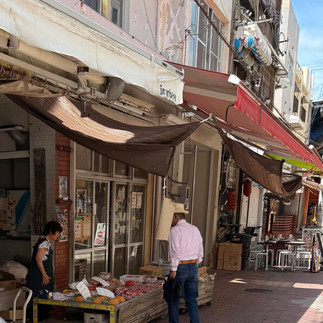A Southern Seas Gall
- Evangelia Papoutsaki
- Jul 7, 2025
- 3 min read
It’s official—in case you needed confirmation—I am a southern seas gal, full stop. As happy as I am to venture into northern territories, I am at my best—physically, emotionally, and mentally—in the warm, watery south. Returning to Okinawa reminded me how deeply I love this place: its incredibly kind people, its light, its nature, and yes, even its climate. I’ll take the hot, steamy weather any day; my body thrives in it.
And the food! I’ve been overdosing on tofu champuru and fresh goya juice daily, while devouring those intensely flavorful small mangoes—so delicious, it feels like a sin to throw away even the skin. But beyond the flavors, it’s the people of Okinawa who move me most. Despite their deep wounds and historical trauma, they carry an unshakable zest for life and an open-hearted kindness towards and genuine curiosity about others.
Since returning to my favorite market in the world for research, it feels like coming home. Familiar faces, bustling stalls, and curious obachans in their 80s and 90s strike up conversations with me, this foreigner who—despite her limited Japanese—delights in chatting with them, feeling seen and welcomed. It never ceases to amaze me how they find ways to connect so genuinely, always eager to bridge the linguistic gap with a stranger.
At lunchtime, I sat at a tiny eatery tucked inside one of the arcades, run by two women. At the peak of my COVID symptoms, I was content just sipping miso soup outside, watching passersby in a part of the market slowly transforming—traditional women’s clothing shops giving way to izakayas and trendy bars. But this little spot seemed frozen in time, its décor untouched since the 1960s. The tofu champuru tasted like home cooking, generous and comforting.
An older man sat nearby, likely a laborer, with a glass of Orion beer, a slice of fried Spam, and a small ball of rice—his modest lunch. I hadn’t realized he’d noticed me until he offered me the tissue box. Grateful, I meant to say “yasashii" (kind) but instead blurted “yasai" (vegetable). It’s my most frequent—and Freudian—mistake in Japanese. Maybe all vegetables are kind, making all vegetarians kind by default? (Don’t ask!) The ojisan burst into laughter at being called a vegetable, and I joined in, raspy-voiced, apologizing and correcting myself. The moment’s hilarity was much needed.
We ate in companionable silence until I got up to leave—and once again, he helped, pointing out my fallen face mask. Sharp-eyed for someone who’d been sitting with his back to me! This time, I nailed it: “Totemo yasashii desu" (Very kind). He smiled, waving it off as if to say, “Don’t mention it."
Minutes later, I repeated the mistake with an obachan at a clothing stall. She gently corrected me but kept chatting, happy I’d visited her shop, happy I liked the dress, and happy to give me a discount. By the time I reached a vegetable vendor—an ancient obachan—I vowed not to slip up again (though calling her “Ms. Vegetable" would’ve been fitting!). I left with a bag of those addictive small mangoes and a successful mini-conversation that visibly delighted her—especially when I almost truthfully said, “I live here" (willing it into reality).
Vitamin C-rich fruit in hand to battle COVID, I headed back to my hostel, detouring for my daily goya juice—so refreshing in the sweltering heat. The woman that runs the stall welcomed me back: “Where’ve you been?" “Hokkaido,"I said. She mock-shivered, and I agreed: “I missed your goya juice!" which contained in it all things Okinawa I had missed.
As I walked away, someone called out—the Okinoerabu café owner, waving hello (I’d been there with colleagues the day before).
I. Love. Okinawa






























Comments